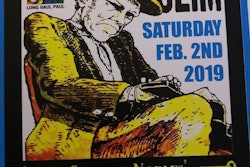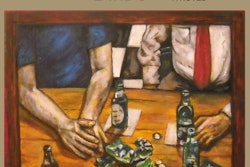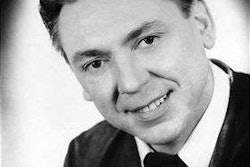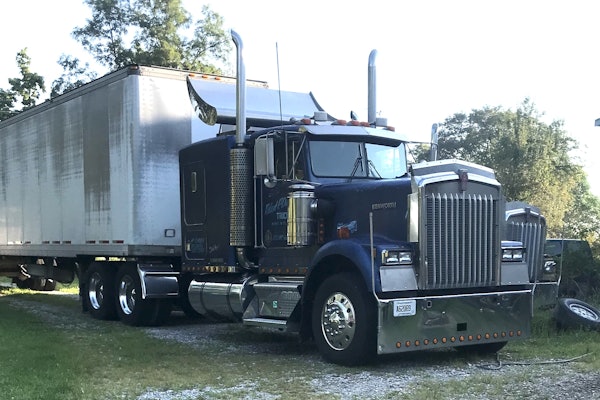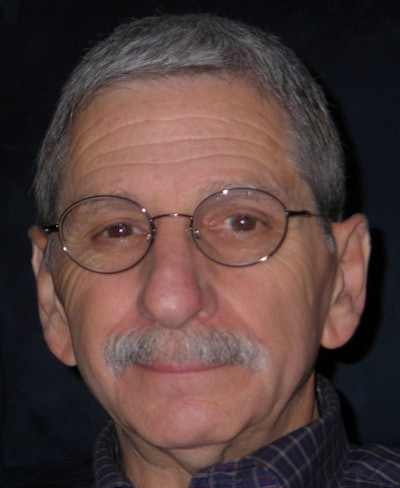
“I really enjoyed driving big trucks,” he says, which is evident in the long-haul portrait – warts and all – that is his new literary memoir In the Driver’s Seat: Interstate Trucking – a Journey. The book is a portrait of long-haul life unparalleled in its honest intensity, a quality many drivers will no doubt appreciate in spades. It chronicles his 10-year trucking career, a million and more safe miles logged from 1991 to 2001 as a company driver for and then leased to the same carrier, “dispatcher buster” of a tape recorder at the ready — and getting hard use.
Told in a muscular, viscerally impressionistic style 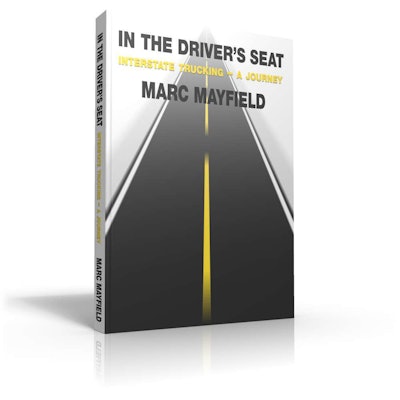
As his love for trucking grows, the job brings big self-insights in the thrill of process, flux, solitary time. A marriage is stretched to the breaking point, trucks are leased, sold, trucks break down, trucks are hit in parking lots, a wife joins her husband on the road, a wife gets off the truck. Accusations of negligence are fought against, lies are told, exposed, truths by the truckload revealed. It’s a wild ride of story, to say the least, told in a confident voice you just might recognize.

Mayfield’s been at work on the book – and getting it published – since he formally retired. “I know a lot of the guys who drive don’t have the luxury of making the choice I made” to retire, he says. “They have to be out there to work” and continue to negotiate on-highway and home life, a big theme in In the Driver’s Seat.
His goal with the whole project: to get the trucking experience form the driver’s perspective on the page so that the world can see the job for what it is, not the “tired trucker” portrayed in the mainstream media. “Other than [Bryan Di Salvatore’s Truck Stop] book, there’s nothing I felt that I’d found that was written by drivers that really brought the whole thing out there in front of me, three-dimensional and in full color. I was hoping to really write something that would be taken seriously by the industry and by regulators, law enforcement folks, academics, and I also wanted to touch educated, general readers.”
And mostly he wants to hear from you, he says. “I’d like to know if somebody wants to punch me in the nose and tell me I’m full of bull or that I nailed it. I’d love to hear from drivers.”
His email address is on the book’s back cover.
Find some excerpts below, and it’s available via Amazon in print ($13.05) and for the Kindle ($2.99).
Mayfield was kind enough to give us the opportunity to share some of the book here in excerpts — from the opening chapter and Chapter 7, the latter situated at a pivotal point in the narrative, after he’s been on the road for two years. Enjoy.
From Chapter 1
People asked me, “What’s it like out there? What’s long-haul trucking really like?” They always asked twice, as if I had a secret, and my short answer was always the same: “You have to like being alone.”
What’s it like out there? What’s the long haul really like?
It is distances between loading docks and distances between people. Phone calls from truck stops on anniversaries and kids’ birthdays. Long-distance marriage and long-distance divorce. Over-the-road means away-from-home. Families take the hit. Truckers’ marriages survive on phone calls if they survive at all, and the strongest endure because they work for two or three nights every four or five weeks.
Sometimes there’s sunshine, dry pavement, and highway glory. Sometimes it’s all-night drives through blowing snow and days when wind, rain and the windshield wipers never stop.
It is seventy-hour workweeks without overtime. Piecework, but you’re not paid for every piece. Driving without sleep, sometimes. Unpaid time at loading docks. Going without a shower for a few days. Truck-stop crimes committed in the names of food and coffee. Heavy traffic and threats by the minute to your life, your truck, and your customer’s freight. An occupation of noise, vibration, health risks, and hearing loss. It is the best of jobs, it is the worst of jobs — Grand Tour, sweatshop, sweet dream, recurring nighmare.
Pay isn’t always what recruiters promise. Your home-time is at a dispatcher’s convenience, Tuesday and Wednesday one month, Sunday and Monday the next, Saturday afternoon to Sunday evening the next — your company will tell you that’s a weekend. Drivers quit, sign on at other carriers, and quit again and again. Annual employee turnover at most trucking companies exceeds 100 percent, and with good reason — trucking isn’t for everyone.
—
You arrive on time for a 5:30 a.m. loading appointment, open the trailer doors, and back in. The shipping clerk says, “I’ll come out to your truck when the paperwork’s ready,” and he does, at 4 p.m. You’ve been up since 5 a.m. Your delivery is set for 4 o’clock the next morning 768 non-stop miles away and you don’t dare show up late, but that’s not the clerk’s problem. Have a nice night…
—
People often wanted to know if I drove the same route all the time.
“No,” I’d say. “I drive irregular linehaul. I’m all over the map.”
“You’re a Teamster, aren’t you?”
“No. These days, most truck drivers aren’t union members.”
—
Non-union, irregular-route trucking isn’t eight daily hours on the job then a commute home to the family, five days and 40 hours looking forward to another weekend, week following predictable week, and paid holidays. It is camping out two, three, four, or five weeks in your truck. Maybe a load gets you home for an evening, maybe not. Think of day shift, swing shift, or graveyard and of working any one, two, or three of them — or split parts of them — in the same 24-hour period, then other parts in the next 24, no two days ever alike, day after day. You take your time off 500, 1,600 or 2,500 miles from home….
They could have called it “unpredictable” or “sporadic” — it is both of those — but “irregular” is the preferred shorthand because no single, regular route is followed and no two routes are exactly alike. Truckload after truckload, year after year, you hardly ever see the same dock twice. You haul whatever to wherever, whenever….
Your pathways on the content cross and cross again, like scribbles on a blackboard. You see the country coming and going.
You earn extra pay for multiple stops, so you run Genuine American Oak tables (made in China) from Fife, Wa., to Lee’s Summit, Sedalia and Jefferson City, Mo., Louisville, Ky., and Norfolk, Va. Refrigerators from Denver to Helena, Great Falls and Havre, Mont. Paper towels from Portland, Ore., to Los Angeles, Commerce, Pacoima, Pomona and Lancaster, Calif.
Many of your loads are expedited: they emphatically cannot deliver late. They’re “hot.” A receiver’s dock is 2,400 miles away and you have to arrive between 1:45 a.m. and 2 a.m. three-and-a-half days after your pickup. You’re an hour early. Or your load is due at a consignee 10 hours after you leave the shipper. You driver every minute of the 10 hours to get it there on time — freight couldn’t be hotter than that…
—
Most of the truck drivers I met out there were intelligent, hardworking men and women, some with formal educations far beyond high school, many with the common sense no college degree ever conferred. Everyday people. The usual assortment of human and political persuasions. Rednecks. Liberals. Rush Limbaugh devotees. Some were openly gay and some were probably lesbians.
Straight or not, a woman in the driver’s seat scared some guys and they gave it up on the CB.
“Ain’t you got a husband to do the work?”
“Why don’t you get back in the bedroom, where you belong?”…
Crap, all of it. Trucking takes all kinds and if you stay out here long enough you’ll meet them. Drivers who talk to themselves in parking lots. Hyper-social types who can’t shut up in restaurants and truckers’ lounges. Quiet, self-assured old hands. Cowboys who can’t see past big hoods and chewing tobacco. Arrogant newcomers from white-collar fields who think they’re smarter and better, who are nervous about getting down with the rest of us, who don’t learn to truck faster than anyone else….
—
You turn on your CB — part tool, part toy — and click through the channels: 15 on the Grapevine, 17 up and down I-5 in California and Oregon, 21 between Southern California and Phoenix, 19 just about everywhere else. Truckers key up to ask about road conditions and the weather, give each other Smokey Bear reports, tell lies and true-life tales. Everyone talks shop. Tell me about your company, I’ll tell you about mine. When a carrier has trouble keeping drivers, when a fleet manager has trouble keeping promises, when a dispatcher is a habitual liar, truckers name names. Then they talk about four-wheelers, hunting, fishing, freight, trucks, truck stops, fuel prices, sports, politics, religion, food. Men talk about women and women talk about men. Sometimes you hear whole conversations. Sometimes you catch a few words before the voices fade and the drivers are out of range.
—
“What do they call you?”
“Spider Man.”
“They call me Basket Case.”
“Do you know the difference between a billboard and a patrol car?”
“Most definitely?”
“Good deal. You’re front door.”
—
“Peterbilt is the only truck I’d take to a desert island.”…
—
“Westbound, you look good back to the state line. What’s it like over your shoulder?”
“I ain’t seen nothing’ since I left New York.”
“Friend, we’re in Utah.”
“Like I said, I ain’t seen nothin’ since I left New York. Night before last.”
—
Near Evanston, Wyo.
A westbound driver said, “I’ve got a load of Rice Krispies from Canada. Been listening to them all the way across: ‘Snap, Crackle, and Pop — eh?”
—
Ten miles east of the truck stops at Youngstown, Ohio.
“That chicken sandwich you bought back there. How’s it taste?”
“Kind of like chicken.”
“Like chicken?”
“Kind of.”
—
Near Moriarty, N.M.
A woman said, “Sweetheart, my exit’s coming up. It’s sure been nice running with you.”
Sweetheart’s comeback was the sound of a big, slobbery kiss, a real wet smacker. The woman laughed and said, “What’s that for, darlin’?”
“Honey,” Sweetheart said, “you just put that where it’ll do you the most good.”…
Chapter 7
Whether you think you can or think you can’t, you’re right. –Henry Ford
I was talking with a friend in my living room, telling him road stories, telling him that trucking was the best job I’d ever found.
“It’s great,” I said. “I’ve never been so at-home with my work.”
“Yeah, but are you making any money?”
Not really. No.
Pay started at 22 cents a mile. A six-hour grunt-work unload got you $40. At most a Linehaul solo driver in 1991 might gross $24,000 during his first full year after training and that took more luck than brains, but I didn’t complain. I was there to learn and my labor came with a bonus that didn’t cost my employer anything: I was able to keep almost completely to myself.
I never ate at truck-stop lunch counters — too much friendly banter, too much whining, too many know-it-alls. I hardly ever keyed up, and, once, faked partial deafness to avoid a conversation in a truck-stop coin laundry. I tapped an ear and shouted, “Sorry! Left both aids in the cab! Can’t hear a thing without them!”
When I had to, I’d share a few words with a dispatcher, another driver, or a cashier at a fuel desk, then climb back into the truck with only my thoughts for company, but I craved seclusion and I lived for the perfect anonymity of the days when I didn’t talk to anyone. Gayle didn’t realize at first that I had a problem. I kept it hidden, but after two nights at home I was climbing the walls, I needed to be alone again, I needed to get back to the highway.
—
“You’re hooked,” my terminal manager said. “You’re a run junkie. Just what we’re looking for.”
He had no idea.
Trucking had grabbed onto me and whether it was more drug than fever I couldn’t say. I was as devoted to my in-cab isolation as any addict is to his habit. Above all else, truck driving meant solitude to me. And time. Time to roll and reflect. Time to rub the veneer from lies I’d been telling myself for years. Time to get below the surface and relive every wrong turn and discarded relationship. Time to revisit my failures and awkward moments, public and private. Small stuff, really. Little ticks in a life. No big deal, no one got killed, just disappointed. In me.
—
It seems I’ve always been in search of solitude, my own unquestioned best way.
Grade-school summers were spent alone, riding to the ends of city bus lines just to see what was there; watching ships unload at old wooden piers; reading in musty public libraries, going everywhere in the world by book, awed by issues of Life magazine from the 1930s and 1940s.
Latchkey kid. Practically an only child. Bound to isolation, bound to himself, alone even among friends and family. Alone, but never lonely.
—
Later, there were solo backpacking trips in the Sierras; solo weekends on Oregon beaches; a summer-long solo trek through Utah and Arizona; a road trip east across the country and back through Canada — solo, most of the time; week-long solo escapes to the rain-shadowed Owens Valley and its towns nestled beneath the high wall of the Sierra Nevada. I often thought, Move to Bishop — you’ll find something to do there. It’s small. It’s perfect. Instead, ever unsure about where to go and what to do for a living, I registered for one aimless college semester after another.
—
Professors’ notes, written on term papers. Canaries in my coal mine.
“You’ve done a great job. Don’t have the heart to knock you for being late.”
“Good job, but it’s late. Try to focus on your work — you’ll get more done. I wish you had more confidence in yourself.”
“Your work is very good. I hurt because you can’t turn things in on time. You need help.”
Who me? Listening to advice and counsel was for other people. Learning from mistakes was for other people. Getting on in life was for other people.
I often left term papers, homework assignments, songs, and short stories unfinished. Sustained by the tension of works-in-progress, I was always busy being busy. I never went from “I’m doing something” to “I’ve done something. What’s next?” The projects were trustworthy companions and I took good care of my friends and I took good care of my friends, kept them, neat and tidy, in manila folders arranged and rearranged on my desk every day. If something was troubling or difficult, it went to the bottom of the stack. I didn’t understand that you stay with a job until it’s done, even if it makes you uncomfortable; that you set goals for yourself and don’t make promises you won’t keep; that you turn your work in on time; that you pay attention.
I put aside thoughts of the Owens Valley and began to think I’d look for a town on the Oregon Coast, get away from college and keep away from it. Learn carpentry. Build houses. Work on fishing boats. I was always going to do those things.
I grew a bear, hid behind it for 20 years, shaved the thing off a few months before I got into trucking, and saw a pale clown in the mirror, a con artist who talked about honesty while he held the truth at arm’s length. I didn’t know him at all. When had he started running in ever-tightening circles, making the same mistakes again and again, repeating his life’s cycles? I didn’t want to deal with that.
—
Hauling a load across Wyoming one night, I started thinking about bullies I’d known. The teenage foursome that beat me up when I was nine. The kids who punched other kids at recess. The big kid who always wanted my grade-school lunch money. The bigger kid who borrowed my prized Rawlings baseball glove, refused to give it back, and threatened to brain me with a bat if I told anyone. The junior high school gym teacher who brought a camera into the boys’ shower room, snapped the shutter nine or ten times, and warned everyone not to tell. The guy who liked to hit his employees in the stomach — hard but not too hard, he was just fooling around, right?
“What are you going to do about it?” The voice came out of the sleeper and I knew that if I turned around the speaker would be sitting on the bunk, one of those punks from fifth grade, grown up and looking for a rematch.
I said, “Get out.”
Then I was yelling, “Get out!”
Then I was screaming, “Get out! Get out! Get out!”
“Deal with it,” said another voice. “Now or never.”…
—
Driving, always driving. I relived the times I understood nothing. The times experience taught me nothing. The time I looked in a mirror and saw … nothing.
Life.
I was in over my head.
I wasn’t paying attention.
I had a lot of catching up to do.
Maybe I would start by bringing the truth in a little closer. Maybe I would start by talking to the trucker in the mirror, asking questions and listening to his answers. Our conversations took place day and night and I’d come home from the road and Gayle would say, “You look tired,” and I would answer, “I feel like I’m working two jobs.” I was in process and the past was in motion. I thought of it as psychological warfare, and I had time for the fight, all the time I’d ever need. I just had to drive a truck and be myself — as soon as I found out who that was.
It took two years, some 240,000 miles, and I don’t know how many sleepless nights.
—
Early one morning at a truck stop in Portland, Ore.
A well-rested driver — he’d been sleeping a lot better lately — smiled back from a shower-room mirror. He was neither handsome nor ugly, inside or out. I liked him. I knew him fairly well. I could read between the lines on his face. He said, “The answer, as you now know, is that you have to find your own answers, learn every lesson, and keep rolling. We all make mistakes. We all have regrets. You can’t change the past. You have to believe in yourself. Henry Ford was right.”…

